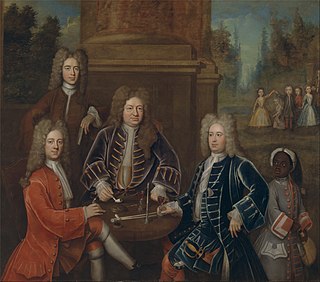
Richard Edgcumbe, 1st Baron Edgcumbe, of Mount Edgcumbe in Cornwall, was an English Whig politician who sat in the English and British House of Commons from 1701 until 1742 when he was raised to the peerage as Baron Edgcumbe. He is memorialised by Edgecombe County, North Carolina.
Sir Gilbert Heathcote, 1st Baronet, was a British merchant and Whig politician who sat in the English and British House of Commons between 1701 and 1733. He was a Governor of the Bank of England and was Lord Mayor of London in 1711.
Henry Hyde, 4th Earl of Clarendon and 2nd Earl of Rochester, PC, styled Lord Hyde from 1682 to 1711, was an English Army officer and Tory politician who sat in the English and British House of Commons from 1692 until 1711 when he succeeded to the peerage as Earl of Rochester.
Sir William Withers of Fulham, Middlesex was an English linen draper and Tory politician who sat in the English and British House of Commons between 1701 and 1715. He was Lord Mayor of London from 1707 to 1708.

John Smith (1656–1723) of Tedworth House, Hampshire, was an English politician who sat in the English and British House of Commons between 1678 and 1723. He served as Speaker and twice as Chancellor of the Exchequer.

Lord James Cavendish FRS of Staveley Hall, Derbyshire was a British Whig politician who sat in the English House of Commons between 1701 and 1707 and in the British House of Commons between 1707 and 1742.
Sir Thomas Hales, 2nd Baronet, of Bekesbourne and Brymore in Kent, was an English politician who sat in the English and British House of Commons between 1701 and 1747.
Thomas White of Wallingwells, Nottinghamshire, was an English landowner and Whig politician who sat in the English and British House of Commons between 1701 and 1732.
Sir John Hawles (1645–1716), of Lincoln's Inn, was an English lawyer and Whig politician who sat in the English and British House of Commons between 1689 and 1710.

General Charles Churchill was a British Army officer who served during the War of the Spanish Succession and an English politician who sat in the English and British House of Commons from 1701 to 1710. He was a younger brother of John Churchill, 1st Duke of Marlborough and both his military and political careers were closely connected with his brother's. Along with Marlborough's Irish Chief of Staff William Cadogan, he was one of Churchill's closest advisors. He was a Tory, in contrast to his Whig brother who tolerated and possibly used Churchill's Tory connections.

Sir William Courtenay, 2nd Baronet of Powderham Castle, Powderham, Devon, was an English landowner, a leading member of the Devonshire gentry and Tory politician who sat in the English House of Commons from 1701 to 1707 and in the British House of Commons almost continually from 1707 to 1735.
Sir Richard Sandford, 3rd Baronet was an English landowner and Whig politician who sat in the English House of Commons between 1695 and 1707, and in the British House of Commons from 1708 to 1723.

Henry Thynne was an English Tory politician who sat in the English and British House of Commons from 1701 to 1708.
Sir Thomas Crosse, 1st Baronet was an English Brewer and Tory politician who sat in the English House of Commons and British House of Commons between 1701 and 1722.
George Gregory (1670–1746) of Nottingham was an English Whig politician who sat in the English and British House of Commons between 1701 and 1746.

Sir Edward Ernle, 3rd Baronet of Charborough in Dorset, of Brimslade Park and Etchilhampton, both in Wiltshire, was an English Whig politician who sat in the English and British House of Commons between 1695 and 1729. He had mixed fortunes in finding or holding a seat and often depended on his father-in-law to bring him into his own seat at Wareham when a vacancy arose.
Samuel Shepheard (1677–1748), of Exning, Suffolk, near Newmarket, Cambridgeshire, was an English Tory politician who sat in the English House of Commons in 1701 and in the British House of Commons almost continually for forty years from 1708 to 1748.
Sir John Ward, of Hookfield, Clay Hill, Epsom, Surrey and St Laurence Pountney, London, was a British merchant, banker and politician who sat in the House of Commons between 1701 and 1726. He was an original Governor of the Bank of England and served as Lord Mayor of London in 1718.
Sir Humphrey Briggs, 4th Baronet, of Haughton, Shropshire, was an English Whig politician who sat in the English and British House of Commons between 1701 and 1727.
The list of by-elections in the United Kingdom is divided chronologically by parliament:






